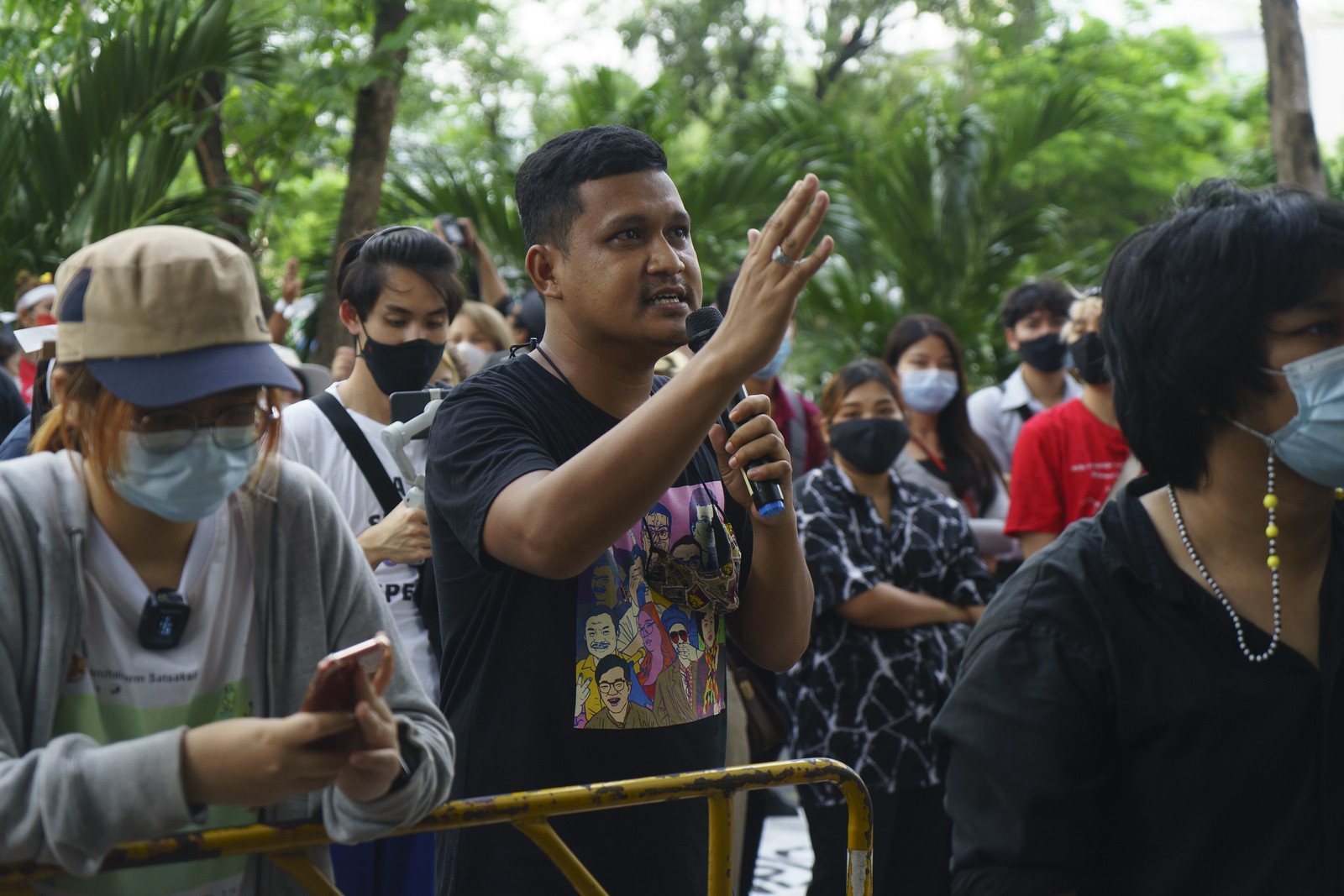Police have requested Nonthaburi Provincial Court to revoke the bail for activist Chinnawat Chankrachang after his Facebook post asking Princess Bajrakitiyabha’s opinion on the royal defamation law. Although the Court has rejected the request, it added bail conditions restricting his activities concerning the monarchy and even the lèse majesté law itself.

Chinnawat Chankrajang
According to Thai Lawyers for Human Rights (TLHR), Nonthaburi police asked Nonthaburi Provincial Court to revoke Chinnawat’s bail in his royal defamation case, which stems from his speech about the assets transferred to the Crown Property Bureau during the “Stand Against Detention” activity at Tha Nam Nonthaburi Pier on 4 February 2022.
The police acted after Chinnawat posted on 19 March, “Ong Pa (Princess Bajrakitiyabha ) lives at Ladawan Village Nonthaburi. I very much want to have an audience with Her Highness soon. I, as a regular citizen, want Ong Pa to express an opinion whether having Section 112 [of the Criminal Code] or not having Section 112 would damage the monarchy in some way,”
The police claimed that the post violated the bail condition of not being involved in any activities that could in any way damage the monarchy and Court.
Before the hearing, the Court questioned Chinnawat over the reason for the bail revocation. He replied that he posted the message on Facebook after he had been repeatedly harassed at his home, something that took place every time a royal procession used Khae Rai Road, Nonthaburi, near to where his home is located.
The Court then asked Lt Col Samut Ketya, Deputy Superintendent (Investigation), Muang Nonthaburi Police Station, how the post damaged the monarchy as set in the bail condition. Lt Col Samut said that he would leave the decision to the Court.
After 15 minute in camera consultation between Lt Col Samut and the judges, who ordered Chinnawat and others to leave the courtroom, the Court ordered Chinnawat and the police to agree on a bail condition.
Chinnawat asked that the Nonthaburi police not harass him at his home in exchange for him not posting or raising any banner about the monarchy, starting from 4 April.
The police requested 2 conditions for Chinnawat; first, no banners with messages related to the monarchy along the route of the King and other royal family members; second, no speeches that would infringe on the monarchy and other royal family members at the clock tower at Tha Nam Nonthaburi Pier. Chinnawat agreed to the conditions.
After both sides came to an agreement, the Court emphasised that it would revoke bail immediately if there is another request. When Chinnawat asked what would happen if it was the police who violated the agreement, the Court said that he would have to testify on that matter before the Court which would then consider it.
TLHR observed that this case differs from other bail revocation cases in that the Court allowed the police and the defendant to set the bail conditions. Normally, it is the Court that decides unilaterally whether bail should be revoked, and what kind of additional bail conditions should be set.
Under Section 112 of the Criminal Code, royal defamation is punishable by up to 15 years in jail. While the letter of the law only covers deeds or words that “insult” or “threaten” the King, Queen, Heir Apparent, and Regent, the offense is routinely extended to include any action that can be deemed negative toward the Royal Family.
It must be noted that Princess Bajrakitiyabha does not fall into the category provided by the law. There is also no legal basis for outlawing discussion of Section 112 itself .
Police investigators regularly recommend that the court remand in custody suspects accused of royal defamation, citing flight risk.
If the court rejects the police recommendation, the bail is allowed either for free or with a bond. Royal defamation cases soared after a de facto moratorium ended on 24 November 2020, and many of the accused have been allowed bail on condition that they do not commit a similar offence, which specifically can mean no public criticism of the monarchy or attendance at public protests that criticise the monarchy.
As of 1 April 2022, 183 people have been charged under the lèse majesté law under 194 cases since November 2020.
Since 2007, Prachatai English has been covering underreported issues in Thailand, especially about democratization and human rights, despite the risk and pressure from the law and the authorities. However, with only 2 full-time reporters and increasing annual operating costs, keeping our work going is a challenge. Your support will ensure we stay a professional media source and be able to expand our team to meet the challenges and deliver timely and in-depth reporting.
• Simple steps to support Prachatai English
1. Bank transfer to account “โครงการหนังสือพิมพ์อินเทอร์เน็ต ประชาไท” or “Prachatai Online Newspaper” 091-0-21689-4, Krungthai Bank
2. Or, Transfer money via Paypal, to e-mail address: [email protected], please leave a comment on the transaction as “For Prachatai English”
